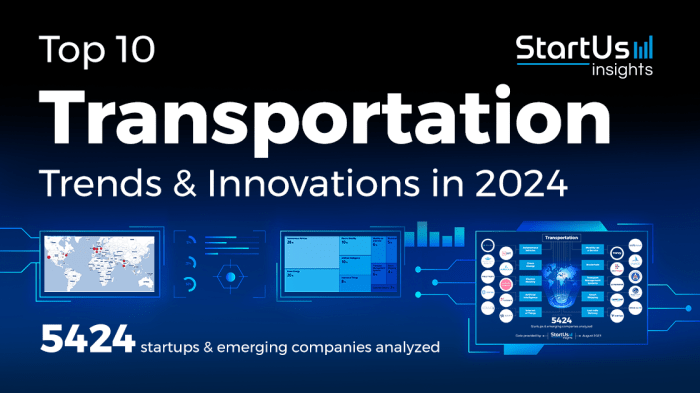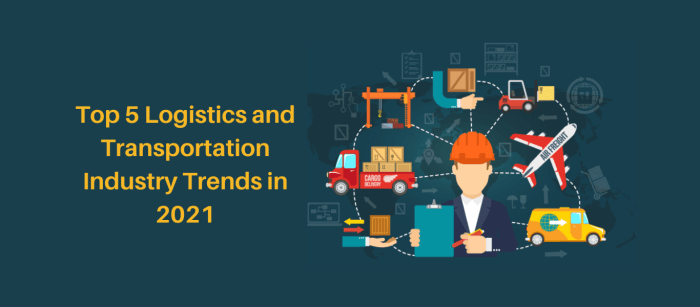
Embark on a journey through the dynamic landscape of transportation and logistics industry trends, where innovation and evolution converge to shape the future of how we move goods and people. From technological advancements to sustainability initiatives, explore the key drivers transforming this vital sector.
Delve into the intricate relationship between textiles, nonwovens, and transportation, uncovering how these materials play a crucial role in vehicle manufacturing and sustainable practices. Learn about the strategies for creating and developing successful businesses in this competitive field, along with the significance of domestic services and translation solutions in ensuring seamless operations.
Transportation and Logistics Industry Trends
The transportation and logistics industry is constantly evolving, driven by various trends that are shaping its future. These trends are influenced by a combination of factors such as technological advancements, changing consumer preferences, and global economic conditions.
Impact of E-commerce Growth
The rapid growth of e-commerce has had a significant impact on the transportation and logistics industry. With more consumers opting to shop online, there is a greater demand for efficient delivery services and last-mile logistics solutions. Companies are investing in technology to streamline their operations and meet the increasing demand for fast and cost-effective shipping options.
Adoption of Automation and Robotics
Automation and robotics are transforming the way goods are transported and warehouses are managed. From autonomous vehicles to robotic picking systems, companies are embracing these technologies to improve efficiency, reduce costs, and enhance safety. The integration of automation and robotics is expected to continue shaping the future of the transportation and logistics industry.
Focus on Sustainability and Green Initiatives
There is a growing emphasis on sustainability within the transportation and logistics sector. Companies are exploring ways to reduce their carbon footprint and minimize the environmental impact of their operations. This includes initiatives such as using electric vehicles, optimizing routes to minimize fuel consumption, and implementing green packaging solutions. Sustainability is becoming a key driver of change in the industry.
Data Analytics and Supply Chain Visibility
Data analytics and supply chain visibility are playing a crucial role in optimizing logistics operations. By harnessing data insights, companies can improve inventory management, enhance forecasting accuracy, and optimize transportation routes. Real-time visibility into the supply chain allows for better decision-making and improved efficiency throughout the logistics process.
Global Trade and Regulatory Changes
Global trade dynamics and regulatory changes have a significant impact on the transportation and logistics industry. Trade tensions, Brexit, and other geopolitical factors can disrupt supply chains and impact logistics operations. Companies need to stay agile and adapt to changing trade policies and regulations to ensure smooth operations and minimize disruptions.
Textiles and Nonwovens in Transportation
Textiles and nonwovens play a crucial role in the transportation industry, providing solutions for various applications such as vehicle manufacturing, interiors, and protective coverings. These materials offer lightweight, durable, and versatile properties that are essential for enhancing performance and efficiency in transportation systems.
Role of Textiles and Nonwovens in Vehicle Manufacturing
In vehicle manufacturing, textiles and nonwovens are used for a wide range of applications including seat covers, carpets, airbags, insulation, and exterior components. These materials offer benefits such as impact resistance, noise reduction, and thermal insulation, making them essential for ensuring comfort, safety, and aesthetics in vehicles.
Importance of Sustainability in Textile and Nonwoven Materials for Transportation
With the growing focus on sustainability and environmental impact, the transportation industry is increasingly turning to eco-friendly textile and nonwoven materials. Sustainable fibers, recycled fabrics, and biodegradable nonwovens are being developed to reduce carbon footprint, minimize waste, and improve overall sustainability in transportation. By incorporating these materials, manufacturers can contribute to a greener future while maintaining high performance standards in their products.
Business Creation and Development in Transportation

Starting a business in the transportation and logistics sector can be a rewarding endeavor, but it also comes with its own set of challenges and opportunities. In this section, we will explore strategies for launching a successful business in transportation, the obstacles that new ventures may face, and the importance of innovation in driving business development within the industry.
Strategies for Starting a Business in Transportation
- Identify a Niche: Determine a specific service or market segment to focus on to differentiate your business from competitors.
- Build a Strong Network: Establish relationships with suppliers, carriers, and clients to create a reliable network that supports your business operations.
- Invest in Technology: Utilize transportation management systems and tracking tools to streamline operations and enhance efficiency.
- Comply with Regulations: Understand and adhere to transportation regulations to avoid penalties and maintain a good reputation in the industry.
Challenges and Opportunities for New Businesses in Transportation
- Competition: The transportation industry is highly competitive, requiring new businesses to find unique value propositions to attract and retain customers.
- Rising Costs: Fluctuating fuel prices and increasing operational expenses can pose financial challenges for startups in transportation.
- Globalization: Opportunities for expanding into international markets exist, but navigating complex trade regulations and logistics can be daunting for new businesses.
- Technological Disruption: Embracing technological advancements such as automation and data analytics presents opportunities for efficiency gains but requires investment and adaptation.
Importance of Innovation in Business Development within Transportation and Logistics
Innovation plays a crucial role in the growth and sustainability of businesses in the transportation sector. By implementing innovative solutions such as route optimization algorithms, predictive maintenance technologies, and sustainable practices, companies can enhance their competitiveness, improve customer satisfaction, and reduce environmental impact. Embracing innovation not only drives operational efficiency but also opens up new revenue streams and business opportunities for growth and expansion.
Domestic Services in Transportation and Logistics

Domestic services play a crucial role in the transportation and logistics industry, catering to the movement of goods within a specific country’s borders. These services are essential for ensuring the smooth flow of products and materials to meet the demands of local markets.
Growth of Domestic Transportation Services
Domestic transportation services have experienced significant growth in recent years, driven by the increasing demand for quick and efficient delivery of goods. With the rise of e-commerce and online shopping, there is a greater need for reliable domestic transportation networks to fulfill orders in a timely manner.
- Expansion of regional distribution centers to shorten delivery times.
- Integration of technology for real-time tracking and monitoring of shipments.
- Diversification of transportation modes to optimize efficiency and cost-effectiveness.
Impact of Domestic Services on the Overall Logistics Sector
The evolution of domestic services has had a profound impact on the overall logistics sector, influencing supply chain strategies and operational processes. By improving the efficiency of domestic transportation, companies can enhance their competitiveness and meet the growing expectations of customers.
Efficient domestic services can lead to reduced lead times and lower inventory carrying costs.
Successful Domestic Service Models in Transportation
Several successful domestic service models have emerged in the transportation industry, showcasing innovative approaches to meet the evolving needs of customers and businesses.
- On-demand delivery services offering same-day or next-day shipping options.
- Collaborative logistics networks that optimize route planning and resource utilization.
- Last-mile delivery solutions using autonomous vehicles or drones for faster and more efficient deliveries.
Translation Services for Transportation and Logistics
Translation services play a crucial role in the global transportation and logistics industry by bridging language barriers and facilitating effective communication between stakeholders across different countries. In this sector, accurate and timely translation is essential for ensuring smooth operations, compliance with regulations, and overall efficiency.
Challenges of Language Translation in International Logistics
- Complex Terminology: The transportation and logistics industry involves specialized terminology that may not have direct equivalents in other languages, making accurate translation challenging.
- Cultural Nuances: Understanding cultural nuances and context is vital to avoid misunderstandings and ensure effective communication between international partners.
- Time Sensitivity: In the fast-paced logistics environment, delays in translation can lead to disruptions in supply chains and impact overall operational efficiency.
Importance of Language Translation in International Logistics
- Compliance: Translation services help ensure compliance with international regulations and standards, reducing the risk of legal issues and penalties.
- Customer Satisfaction: Clear communication through accurate translation enhances customer satisfaction and builds trust with clients from different linguistic backgrounds.
- Risk Mitigation: Effective translation minimizes the risk of errors or misunderstandings that could result in costly delays or logistical issues.
Contribution of Translation Services to Efficient Communication in Transportation Businesses
- Facilitating Negotiations: Translation services enable seamless negotiations with international partners, helping businesses reach mutually beneficial agreements.
- Documentation Translation: Translating important documents such as contracts, invoices, and shipping orders ensures clarity and accuracy in all communications.
- Real-Time Communication: With the help of translation services, transportation businesses can engage in real-time communication with partners and clients worldwide, enhancing operational efficiency.
Outcome Summary
As we conclude our exploration of transportation and logistics industry trends, it becomes evident that adaptation and innovation are the cornerstones of progress in this ever-evolving domain. By staying attuned to emerging trends and embracing transformative technologies, businesses can chart a course towards sustained growth and success in the global transportation landscape.
Quick FAQs
How are technology advancements influencing transportation and logistics trends?
Technology advancements are revolutionizing the transportation and logistics sector by enhancing operational efficiency, optimizing supply chain management, and enabling real-time tracking and data analytics.
What role do textiles and nonwovens play in the transportation industry?
Textiles and nonwovens are essential components in vehicle manufacturing, providing durability, safety, and comfort. They also contribute to sustainability efforts by reducing environmental impact.
What are some challenges faced by new businesses in the transportation sector?
New businesses in transportation often encounter challenges such as fierce competition, regulatory hurdles, and the need for substantial initial capital investment.
How do translation services contribute to efficient communication in transportation businesses?
Translation services facilitate seamless communication in a globalized industry, ensuring accurate exchange of information between diverse stakeholders and enhancing collaboration on an international scale.





